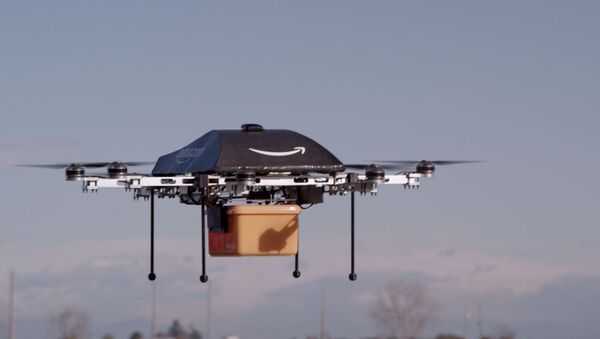Amazon bought Cambridge start-up Evi Technologies two years ago. The firm would not reveal if aerial tests would be performed in Cambridge or any other details on the programme.
Safety concerns for the general public have been raised regarding the intent to deliver with drones: mid-air collisions and damage to personal property leap to mind. But there are also definite problems regarding privacy. For such a system to actually work (and not be plagued by previously mentioned safety issues and misplaced deliveries) it will need to be highly sophisticated.
The service would have to use advanced GPS and tracking to be a viable alternative to traditional methods. By using the service a customer will undoubtedly render their lives even more open to surveillance by major corporate interests than they currently are online.
However before Amazon have to deal with ethical dilemmas they will have to overcome laws in the UK that bar small Remotely Piloted Aircraft (RPA) from flying beyond the normal unaided line of sight of the person operating them and, if fitted with a camera, must not be flown within 150 metres of a congested area.
People who read about the plans on the Cambridge News website aired their feelings, some suggesting that the drones are likely to be a tempting target for yobs with airguns. Others disagreed.
Goodbear wrote: "It's an exciting idea though fraught with challenges, and as it's not costing us anything we should let Amazon get on with its research. However concern about yobs should not be used to stop it. On that basis we would never had had, for example, public telephones or street lights."
Jesus Green apparently can’t wait for a drone delivery: "I hope it happens. I will throw away the parcel and keep the drone."
Amiyara strikes a more serious note: "There are a lot of positive things that could come out of this research, especially the ability to get blood or medicine to crash sites or to transport life organ donations. It's not like people are going to be delivered makeup or a bottle of wine by drone starting tomorrow! The research could have a massively beneficial impact on our lives and all people can do is shoot it down before it's started because "oh no, change!!"
Terry Holloway, managing director of Cambridge Aero Club, which is based at the city's airport, said: "It makes no sense to me. From a legislative point of view the Civil Aviation Authority rules as they currently exist means it's just totally unfeasible to even consider doing this. I have real concerns about how they will deliver parcels safely."
Neither Amazon nor Evi Technologies are listed as having permission for commercial flying of small drones, according to the latest list of approved operators.
Permission is needed to fly small drones commercially or to fly a camera-fitted drone near to people or properties not under their control.
Amazon could trial them without permission on open land, but under current rules no commercial drone operator would be able to practicably use drones for deliveries because the operator needs to remain in the line of sight of the aircraft.
"Significant safety, security and privacy concerns"
A report led by Sir David Omand, a former head of the UK's electronic intelligence centre, GCHQ looked at the dangers posed by private drone use earlier this year.
The “Security Impact of Drones” report stated: "The security threat posed by individuals misusing RPA is a serious one, whether for criminal or terrorist purposes… more thought needs to be given to their employment for malign purposes in the domestic environment.
"It is entirely possible that in a public space like a shopping centre or sporting stadium, an attack could be launched from within. Crowds at sporting events or rallies could be vulnerable in a similar way if a future terrorist group were to look for means of dispersing chemical or biological agents… it is a threat that the UK authorities took seriously during the 2012 Olympics."
The report also warned that delivery drones could be "ideal lookouts for burglars, train robbers and poachers" and that lightweight, commercial RPAs could become the "weapon of choice" for paparazzi in search of photographs of celebrities.


